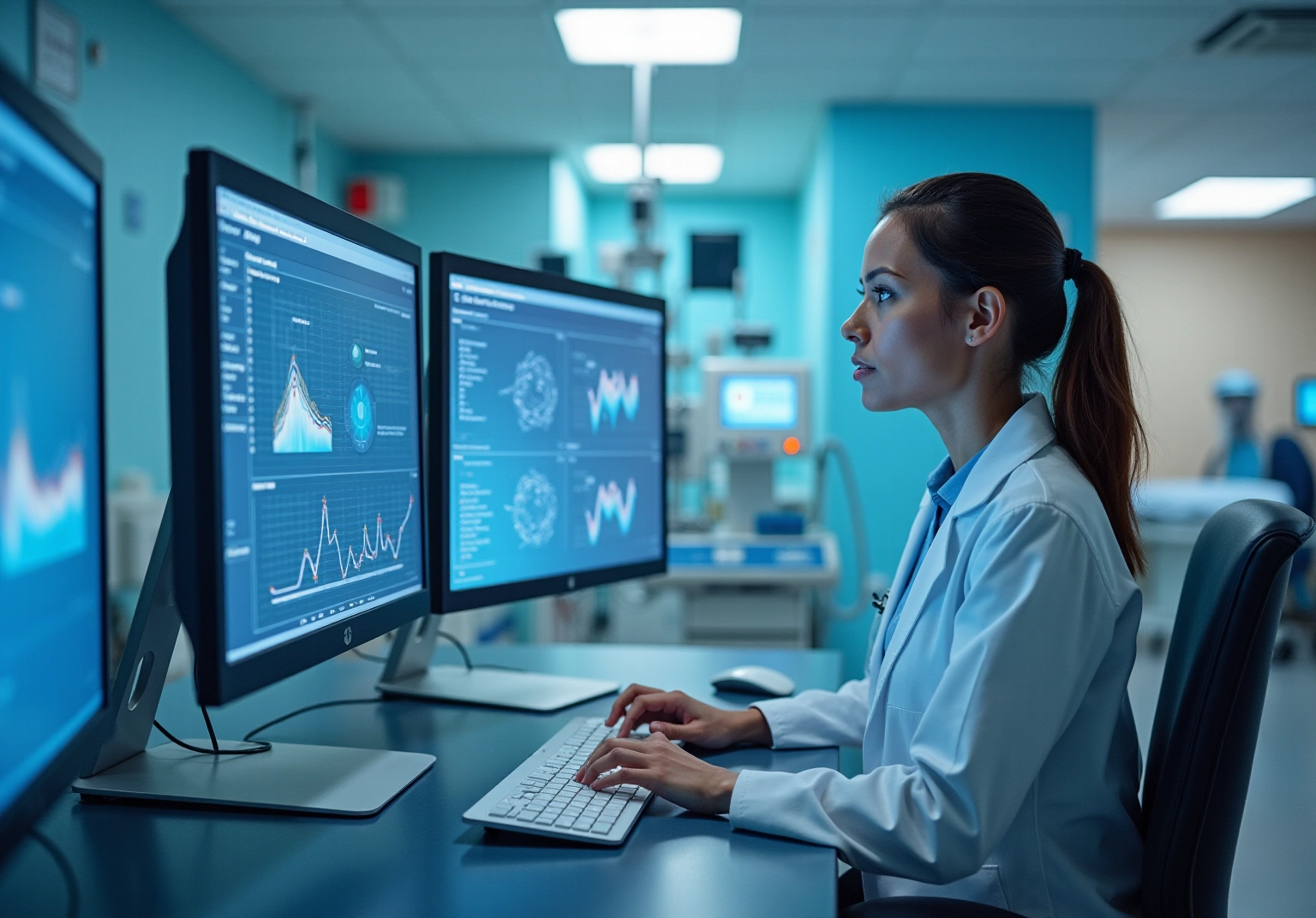
AI tools in healthcare are revolutionizing patient care efficiency by automating critical processes such as:
This transformation not only enhances accuracy but also significantly reduces administrative burdens. Various AI applications, including the Inferscience HCC Assistant and predictive analytics, serve as effective solutions to streamline operational workflows. The implementation of these technologies leads to improved financial outcomes and increased patient satisfaction through timely and personalized care. By embracing AI, healthcare organizations can address current challenges and achieve substantial benefits.
AI technologies are fundamentally reshaping the healthcare landscape, significantly enhancing the efficiency of patient care and outcomes. As medical professionals increasingly embrace innovative AI tools, they streamline administrative tasks while also elevating diagnostic accuracy and improving patient interactions. However, this rapid integration of technology prompts critical inquiries:
This examination of the latest advancements in AI within healthcare highlights how tools such as predictive analytics, virtual assistants, and AI-driven education platforms are revolutionizing the industry and what these changes signify for the future of patient care.
The Inferscience HCC Assistant employs AI tools in healthcare to automate the collection and analysis of clinical data, delivering real-time coding recommendations to medical professionals. This innovation streamlines the HCC coding process and significantly enhances coding accuracy, which is essential for optimizing Risk Adjustment Factor (RAF) scores. By seamlessly integrating with electronic health records (EHRs), the HCC Assistant alleviates the administrative burden on medical staff, enabling them to focus more on patient care while ensuring compliance with coding regulations.
Real-world applications demonstrate that organizations employing AI tools in healthcare, including the HCC Assistant, have experienced a 15% increase in RAF scores and a 22% improvement in predictive accuracy, underscoring the effectiveness of these tools in enhancing financial performance and compliance within medical settings.
Nevertheless, challenges in HCC coding, such as compliance issues and overlooked diagnoses, frequently hinder medical providers. The HCC Assistant confronts these challenges by offering precise coding suggestions, ultimately minimizing claim denials and boosting operational efficiency.
As one medical provider remarked, ‘The Inferscience HCC Assistant has transformed our coding process, allowing us to focus on patient care while ensuring we meet compliance standards.

The HCC Validator harnesses advanced natural language processing (NLP) technology to validate Hierarchical Condition Category (HCC) codes against the established MEAT (Monitor, Evaluate, Assess, Treat) criteria. This innovative resource provides instant feedback, enabling coders to correct errors prior to claims submission.
By ensuring compliance with standards, the HCC Validator mitigates the risk of costly penalties and significantly enhances the accuracy of coding practices. This enhancement is vital, as the American Medical Association estimates that up to 12% of medical claims are submitted with inaccurate codes, potentially resulting in claim denials or payment delays.
By addressing these inaccuracies, the HCC Validator plays a crucial role in improving coding precision, ultimately contributing to better financial outcomes for medical organizations. Furthermore, this resource aids in reducing the likelihood of incorrect payments, which totaled approximately $31 billion in the Medicare fee-for-service program in 2020, thereby streamlining coding procedures and enhancing overall financial well-being.

The Claims Assistant from Inferscience transforms the claims management landscape by conducting real-time gap analyses on claims files. This innovative tool identifies missed coding opportunities, ensuring that medical providers receive all eligible reimbursements. By automating these essential processes, the Claims Assistant significantly decreases the time allocated to claims management, reduces errors, and improves the overall financial performance of medical organizations.
Notably, organizations leveraging AI tools in healthcare for claims management have reported:
This advancement not only streamlines workflows but also allows providers to focus more on patient care while optimizing their financial outcomes.
AI tools in healthcare, like AI-driven virtual assistants, are revolutionizing interactions within medical environments by efficiently managing routine inquiries, scheduling appointments, and delivering customized health information. These AI tools in healthcare not only streamline administrative tasks but also enable healthcare personnel to focus on the more complex needs of individuals, thereby significantly enhancing the overall experience.
For instance, Weill Cornell Medicine reported an impressive 47% increase in digitally scheduled appointments following the deployment of an AI chatbot, underscoring the effectiveness of these technologies in improving access to services. Furthermore, studies indicate that 80% of hospitals are now utilizing AI tools in healthcare to enhance patient care and workflow efficiency, illustrating a growing trend within the industry.
Healthcare professionals are increasingly recognizing the value of AI tools in healthcare, with many asserting that these tools can lead to higher levels of patient satisfaction through automation. As one expert articulated, “Every routine task offloaded to a chatbot is one less burden on staff — and over thousands of interactions, those savings add up.” This perspective emphasizes the pivotal role of AI tools in healthcare, which not only optimize operational efficiency but also foster a more responsive and patient-centered environment.
Moreover, 56% of medical leaders plan to invest in generative AI technology, particularly AI tools in healthcare, within the next three years, reflecting a robust confidence in the future of AI solutions. The medical AI market is projected to grow from $20.9 billion in 2024 to $148.4 billion by 2029, highlighting the significance of AI tools in healthcare in transforming the landscape of medicine.
Predictive analytics resources leverage historical individual data to forecast future healthcare needs, enabling providers to anticipate potential challenges and implement proactive strategies. By examining patterns in individual behavior and health outcomes, AI tools in healthcare not only enhance patient care but also optimize resource allocation. Hospitals employing predictive analytics can foresee admissions, which facilitates improved staffing and resource management. This proactive approach not only reduces costs but significantly boosts the effectiveness of medical service delivery. As leaders in the medical field emphasize, harnessing AI tools in healthcare for data analysis is crucial for making informed decisions that enhance individual outcomes and streamline operations.

AI technologies in medical imaging are fundamentally transforming diagnostics by significantly enhancing both the accuracy and speed of image analysis. Advanced AI algorithms can detect abnormalities in X-rays, MRIs, and CT scans with precision rates exceeding 95%, often outperforming human radiologists. Notably, AI-assisted imaging analysis has improved early-stage cancer detection by 28%, leading to better outcomes for individuals and potentially reducing treatment expenses.
Furthermore, AI systems have demonstrated an impressive 93% accuracy in identifying lung abnormalities, compared to the 65-70% accuracy achieved by radiologists working independently. This advancement not only enhances diagnostic precision but also empowers medical providers to make timely treatment decisions, ultimately improving efficiency in managing patient health.
Radiologists have reported a 50% reduction in image reading times due to AI assistance, allowing them to concentrate on high-value interpretations and clinical decision-making. Consequently, the integration of AI tools in healthcare, especially in medical imaging, represents not just a technological enhancement; it signifies a fundamental shift in how medical professionals approach diagnostics, ensuring that patients receive timely and effective care.
Additionally, AI-optimized imaging workflows could yield approximately $3.7 billion in annual savings for the US medical system, further underscoring the economic advantages of these technologies.

The use of AI tools in healthcare, particularly through natural language processing (NLP) applications, is revolutionizing the medical field by significantly enhancing data management and documentation procedures. These advanced technologies analyze unstructured data from clinical notes, medical records, and various other sources, effectively extracting relevant information to guarantee precise documentation. By automating these tasks, AI tools in healthcare alleviate the administrative burden on medical providers, allowing them to focus more on client support. This automation not only elevates the quality of health records but also promotes better compliance with regulatory standards and enhances overall care delivery through the use of AI tools in healthcare.
For instance, clinical NLP applications constituted 20% of the medical market in 2024, underscoring a growing dependence on these technologies. Organizations like IQVIA have successfully implemented NLP programs, generating substantial revenue and showcasing strong demand for such solutions among leading pharmaceutical companies. Furthermore, the integration of AI tools in healthcare, particularly NLP with electronic health records (EHRs), has proven to be transformative, converting unstructured data into structured formats that enhance diagnostic and prognostic models.
The efficiency benefits derived from NLP are evident, as medical professionals can make informed decisions based on accurate data, resulting in improved interactions between providers and patients. By streamlining documentation processes, AI tools in healthcare not only enhance accuracy but also help medical organizations in providing high-quality care while managing the complexities of modern medical environments.

AI-driven user education platforms are revolutionizing the distribution of medical information, delivering personalized learning resources tailored to individual health conditions and preferences. These platforms empower individuals to actively participate in their healthcare journeys, significantly enhancing health literacy.
Research indicates that organizations implementing robust engagement strategies can achieve an average improvement of:
By fostering a deeper understanding of their health, individuals are more inclined to adhere to treatment plans, leading to improved health outcomes. For instance, medical providers utilizing customized educational tools have reported a notable increase in engagement, with studies revealing that targeted educational initiatives can elevate medication adherence rates by 31-47%.
This transition towards individualized education not only aids individuals in managing their conditions but also contributes to a more effective medical system, ultimately benefiting both patients and providers.

AI tools in healthcare are significantly expanding access to telehealth solutions, particularly for underserved populations. These platforms facilitate remote consultations, allowing individuals to receive assistance from the comfort of their homes. AI tools in healthcare enhance telehealth by providing advanced capabilities for symptom evaluation, appointment organization, and follow-up support, ensuring individuals receive prompt and effective treatment.
Notably, studies indicate that telehealth utilization surged during the pandemic, with a remarkable 766% increase in encounters among insured individuals and a staggering 38-fold increase from the pre-COVID-19 baseline. This surge reflects a transformative shift in healthcare delivery, demonstrating that AI tools in healthcare, such as AI-driven telehealth, can effectively address access disparities.
Furthermore, 67% of individuals perceive telehealth consultations as ‘as good or better’ than face-to-face visits, while 86% of teletherapy users report positive experiences during their virtual consultations, underscoring the effectiveness of remote services. Additionally, approximately 20% of all emergency room visits could potentially be prevented through virtual urgent services, further highlighting the efficacy of telehealth solutions.
As healthcare systems increasingly incorporate AI tools in healthcare, the potential for improved outcomes for individuals and enhanced efficiency in service delivery becomes increasingly evident.
AI technologies are revolutionizing the drug discovery process by leveraging extensive datasets to identify promising drug candidates and predict their efficacy. This innovation is projected to reduce the time required to develop new treatments by up to four years and save pharmaceutical companies approximately $26 billion.
For instance, AI-driven platforms have demonstrated an 80-90% success rate in Phase I clinical trials, significantly higher than the historical average of 40-65%. Companies like Novartis are utilizing AI analytics for real-time production monitoring, enhancing quality control and minimizing waste, which further accelerates the development timeline.
As a result, patients gain quicker access to effective therapies, ultimately transforming patient care and improving health outcomes. The integration of AI tools in healthcare, especially in drug development, not only streamlines processes but also enhances the overall efficiency of bringing new therapies to market, showcasing their potential to reshape the pharmaceutical landscape.
The integration of AI tools in healthcare is fundamentally reshaping the landscape of patient care, enhancing efficiency, accuracy, and overall service delivery. By automating various processes—from coding and claims management to patient interactions and drug discovery—these technologies empower medical professionals to focus on what truly matters: providing high-quality care to patients.
Key advancements such as the Inferscience HCC Assistant, HCC Validator, and AI-powered virtual assistants showcase their significant impact on streamlining administrative tasks and improving coding accuracy. Furthermore, predictive analytics and AI in medical imaging play crucial roles in anticipating patient needs and revolutionizing diagnostics, respectively. Each of these tools not only addresses existing challenges but also contributes to better financial outcomes and patient satisfaction.
As the healthcare industry continues to embrace AI technologies, the potential for improved patient outcomes and operational efficiency becomes increasingly apparent. The call to action is clear: stakeholders must invest in and adopt these innovative solutions to ensure that healthcare delivery evolves in tandem with technological advancements, ultimately fostering a more responsive and effective healthcare system for all.